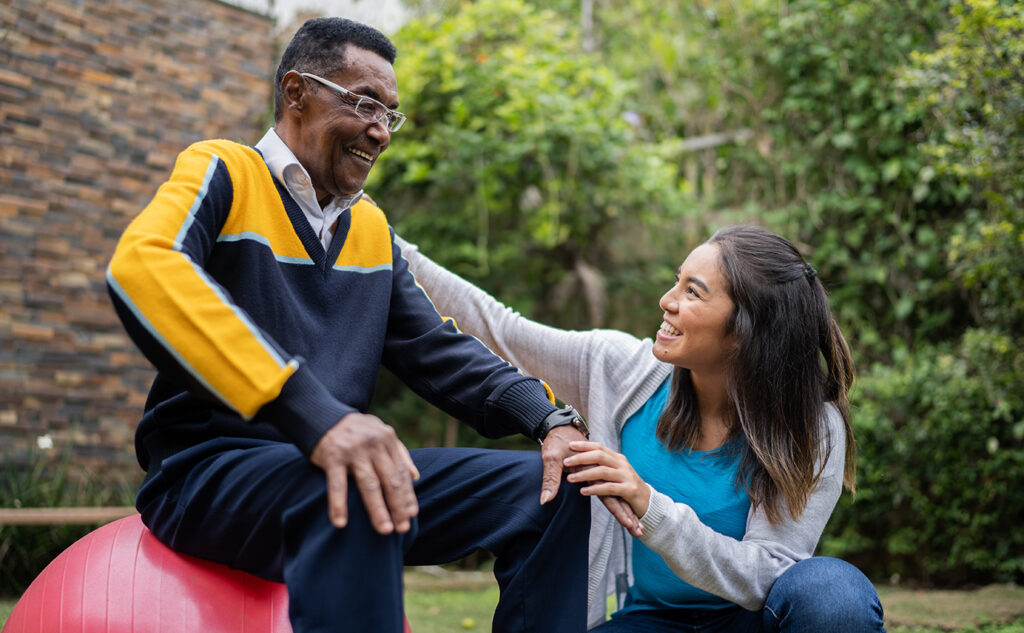Revision hip replacements
- Replace a worn or damaged hip replacement
- Ceramic implants provide long-lasting results
- Highly experienced consultant orthopaedic surgeon


Yvonne’s double hip and knee replacements
Brenda’s revision hip replacement
Patricia’s revision hip and knee replacement
Patricia’s revision hip and knee replacement
Keep your recovery on track
If you’ve experienced the benefits of a hip replacement, you’ll know how life-changing it can be. Unfortunately, sometimes, hip replacements wear out and need replacing.
Revision surgery is an advanced technique that replaces an existing hip replacement with a new prosthesis.


Experienced consultant surgeon
Hip revision surgery is extremely complex, and it requires a high level of expertise. In the last three years, Mr Shah has performed more than double the national average number of revision hip replacements.
During the procedure, Mr Shah will need to carefully remove your existing prosthesis before fitting a new implant. Sometimes your implant will be loose and relatively easy to remove. Occasionally, it can be more difficult to take out, and any damage made to the surrounding bone will need to be repaired.
I cannot wait for bowling season again
I would like to say the care I received from Mr Shah and all the team at Goring Hall was fantastic, with no complaints at all. Thank you for my new pain-free hips. I cannot wait for bowling season again.
- Brenda Page
Personalised care for long-lasting results
Your revision surgery will be carried out under a general or spinal anaesthetic, so you’ll be asleep throughout the procedure. During your operation, Mr Shah will remove your existing implant, being careful to minimise any damage to the surrounding bone and tissue, before fitting your new prosthesis.
To get the maximum life from your new hip replacement, Mr Shah recommends an uncemented ceramic implant when possible. Ceramic prostheses have the lowest wear rate of all implants. Uncemented implants don’t use cement to fix the implant to your bone; instead, they are textured so that over time they integrate with your own bone, providing a longer-lasting bond.


Here to support you at every step
After your revision surgery, you’ll need to stay in the hospital for 4-5 nights, so we can keep a close eye on your progress. You should be able to put weight on your new hip joint within a day of your operation and begin gentle exercise as soon as possible.
Physiotherapy is an essential part of your surgery, and two sessions are included. We recommend that you continue to see a physiotherapist at home, so you can confidently use your new hip in the right way and avoid potential damage.
Once you’ve been discharged, we’ll see you for regular follow-up appointments. You’ll be provided with detailed aftercare advice to help you look after your hip correctly, and we’re always available if you have any questions or concerns.
Start your journey
to a new lease of life
To ask us a question or arrange a consultation with Mr Shah, don’t hesitate to get in touch.
Frequently asked questions
While results can vary, some patients can enjoy their new hip for life thanks to advancements in surgical techniques and implants.
During your hip replacement, your comfort is our top priority. Throughout your operation, you’ll be under the care of a skilled anaesthetist with experience in joint replacement surgery.
It will take months for you to make a full recovery, but you’ll start to see and feel an improvement much sooner. Most patients are walking without support within 4–6 weeks.
It’s hard to believe that a metal or ceramic prosthesis could feel or function like a natural hip joint, but most patients can’t tell the difference.
Revision knee replacements are designed to last, but they may not have the same longevity as an initial knee replacement due to the more complex nature of the surgery and pre-existing bone and tissue changes. With proper care and regular follow-ups, many revision knee replacements can still provide lasting relief and function.


